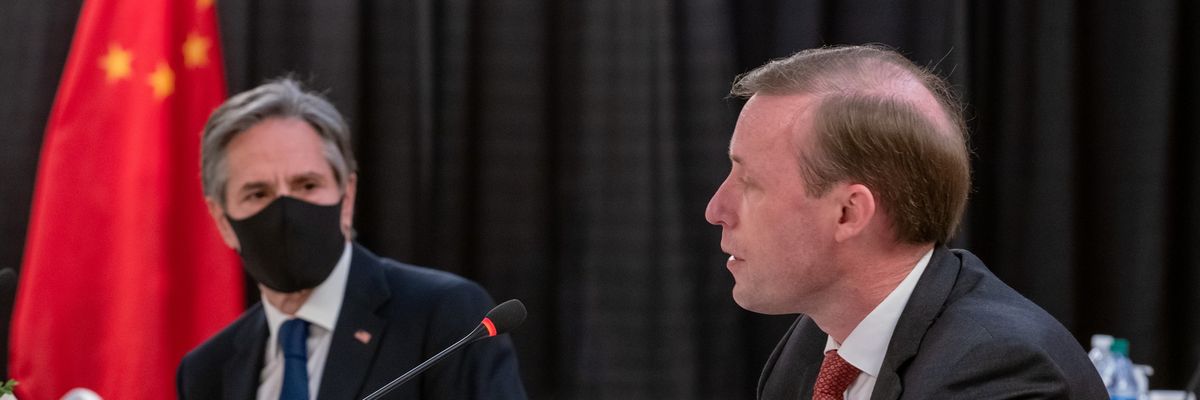Given the rise in anti-Chinese sentiment spawned by the off-shoring of America’s production base to China, the impact of COVID-19, and hyperbolic rhetoric in Washington regarding China’s alleged malevolent aspirations, any number of observers of American politics might easily conclude that Washington is on the precipice of blundering into another war—this time with China. After all, a similar climate of deep-seated paranoia and military hysteria steered the world’s great powers blindly into war in 1914.
The problem with assuming the inevitability of conflict is that many Washington politicians live by the axiom “out of sight, out of mind,” and seek constant media attention. Thus, public statements made by Washington’s publicity seekers in and out of uniform are seldom informative. They never bother to acknowledge that no one should start a war without first establishing the politically beneficial end state a war with China would achieve or how the latest Pacific war would be fought and won. But these are the questions that must be considered.
If the political purpose of a new Pacific war is to change Chinese behavior externally or internally—to render China incapable of resisting American political demands—it is worth noting that China is not Imperial Japan in 1941. Japan’s economy was roughly one-tenth the size of the U.S. economy, and it still required three years of hard fighting by U.S. forces to redeem America’s ignominious defeat at Pearl Harbor and in the Philippines. In addition, when Tokyo decided to attack U.S. forces at Pearl Harbor, Japan was already at war with a number of states including China, Great Britain, and the Netherlands.
Beijing, meanwhile, will not confront a two front war. Neither Moscow nor its Indian ally will risk war with China. However, in the event of war with China, Washington must take seriously the danger of fighting China and Russia, two major regional powers, simultaneously, because Washington is actively hostile to both.
China’s economy is also nearly the size of the American economy and, in contrast to Imperial Japan, Beijing has generally avoided armed conflict with its neighbors despite a number of disputes. In fact, the dramatic success of the regional comprehensive economic partnership—which creates a free trade agreement between China and the Asia-Pacific nations of Australia, Brunei, Cambodia, China, Indonesia, Japan, Laos, Malaysia, Myanmar, New Zealand, the Philippines, Singapore, South Korea, Thailand, and Vietnam—has made Washington’s notion of building an anti-Chinese alliance very difficult, if not impossible. As American diplomats are rapidly discovering, none of these states really wants to be caught in the middle of a conflict between China and the United States.
Left unstated in most discussions about potential conflict with China is what greater strategic purpose U.S. air and naval attacks on the Chinese mainland might actually serve. If a ground war is ruled out—and it would seem rational to do so—it is easy to imagine the destruction of Chinese infrastructure with long-range strikes rapidly becoming an end in itself, as was the case in the Kosovo Air Campaign, Syria and, more recently, Iraq.
In view of the size and depth of Chinese defenses, however, even if the strikes inflict significant losses, a strategic victory with tangible impact on Beijing’s national leadership seems unlikely. Since large concentrations of U.S. air and naval forces in proximity to China’s coasts are difficult, if not impossible, to conceal in the age of space-based intelligence, surveillance, and reconnaissance, the potential for the U.S. Navy’s Surface Fleet and America’s island bases to take serious losses is extremely high.
Put more succinctly, China can absorb the damage. In fact, the most likely outcome is a long series of offensive strikes with diminishing returns over time. The logistical foundation in the Pacific to sustain the required strikes on China is weak to nonexistent. Moreover, China is a nuclear power. An American resort to nuclear weapons would be suicidal. Nuclear weapons are useful to deter nuclear attacks on U.S. territory, but they are otherwise devoid of military utility. A nuclear exchange with China would have grim consequences for humanity and the climate.
All of these points notwithstanding, the potential for war with China will persist. Why?
Between 1960 and 1968, two American presidents, John F. Kennedy and Lyndon B. Johnson—men who lived through World War II and experienced the exhilaration of victory in the Pacific—decided that the enormous resources and striking power of the U.S. Armed Forces made failure in Vietnam impossible. It is not unreasonable to assume that similar attitudes prevail in the White House and the current Pentagon.
President Dwight D. Eisenhower, who remembered the serious human and material losses in the war with Germany, saw warfare through a different lens. He understood the American electorate’s acute intolerance for high casualties and he knew from personal experience the limits of America’s resources.
The personal experience of Kennedy and Johnson during WWII was irrelevant. When the two men were compelled to think on a strategic level during the Vietnam War, they were unable to distinguish the strategically vital from the merely desirable U.S. national interests.
Eisenhower understood the distinction. Were Eisenhower alive today, he would likely ask, “Why should the United States commit to war with China over Taiwan? Would the Chinese attack the United States over Cuba?” Eisenhower would also be right.
This article has been republished with permission from The American Conservative.















